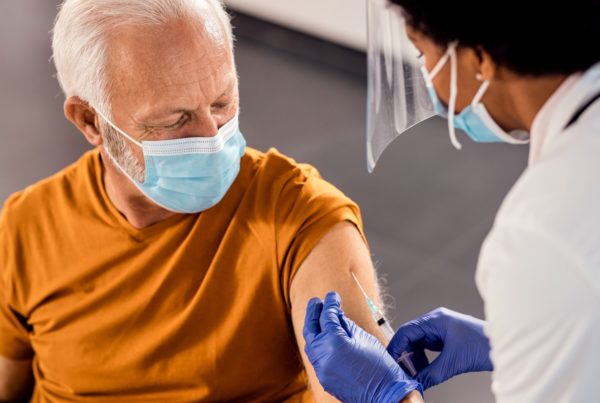
This article is one of the many resources offered within our Health Navigation Platform, giving your members access to credible health information. In it, Medical Director Dr. Michael Szabo provides an overview of vaccinations, the reliability of the medical community at large and how to approach the questions you may have.
I am not a vaccine expert.
I certainly know a lot about vaccines. I’m a family and emergency physician with 25 years of clinical experience. I treat infectious diseases daily. I keep myself up to date on latest findings about vaccines, consulting the best sources of information available. I learn from the many knowledgeable and experienced infectious diseases experts with whom I work.
For balance, I also read a lot about the concerns that some people have about vaccines, so I can better understand the reasons behind vaccine hesitancy. I try to stay current and informed.
Yet despite all my experience, I can’t consider myself a true vaccine expert. A great deal of specialized knowledge about vaccines has been accumulated at this point, and it’s not realistic for me to study and absorb all aspects of this vast and complex subject while maintaining my current physician roles.
Recognizing that you’re not an expert in something is an important skill to have in medicine – and life in general. People who think they’re experts, when in fact they’re not, can be dangerous. I regularly teach this concept to medical students and residents. And every so often, I run into a young doctor in training who is overconfident about their abilities. It can be difficult to work with a person like that. I explain to them that it’s much easier to trust someone who readily recognizes that they aren’t adequately knowledgeable in a specific area – someone who reaches out appropriately for an expert opinion when required, and possesses an appropriate level of humility.
What Being an Expert Really Means
I am an expert in some areas. Managing the acute presentation of chest pain is one of them. As an emergency physician for 25 years, I’ve seen thousands of patients with chest pain, in all sorts of practice settings – including the downtown Toronto emergency room where I currently work, urban family practice and walk-in clinics, isolated northern-Canadian community hospitals, airplanes, nursing homes and First Nations reserves. I regularly attend conferences where the latest information about the management of chest pain is discussed. I know the chest pain literature very well.
I also talk daily about chest pain management with my fellow expert colleagues while working in the ER. We discuss interesting cases and often commiserate with each other, knowing as we do the pitfalls that can be encountered, the diagnoses that get missed, the subtleties that are commonly dismissed – with disastrous results. We realize that when a patient lies in a certain way on a stretcher, it means we should consider a specific, rare cause of chest pain: aortic dissection.
Why do we have this knowledge? It’s because we’ve been immersed in it, we’ve lived it, for so many years. This kind of deep understanding can’t be learned from a textbook or from an Internet search.
In our current age of information overload, the line between expert and non-expert has become seriously blurred for a lot of people. This has major implications for public health. There’s a huge amount of health advice available online, but much of it is of poor quality, or only addresses one tiny piece of an entire knowledge base on a complex topic. The Internet is loaded with misinformation posted by non-experts.
Who Can You Trust?
Personally, I trust the consensus of vaccine experts around the world, which is that vaccines work and are safe, and that a strong evidence base supports this conclusion.
As a parent myself, I understand the desire to protect our children from harm. Vaccines do carry some risks – as does any intervention – but what’s key is that those risks are significantly lower than the benefits. Both of my children are fully vaccinated because I know the risks associated with not vaccinating them are so very much greater.
I think many of us don’t fully appreciate this distinction, because we don’t see firsthand what happens to people who contract serious illnesses like measles and polio. If we did, the benefits of vaccines would be entirely obvious. I remind myself of that all the time.
Furthermore, I trust that vaccine experts will continue to monitor the population for significant side effects. I do think that the public pressure to ensure vaccines are safe ultimately gives us more protection.
But it’s unfortunate that many people don’t trust the global expert consensus on vaccines. Work needs to be done to strengthen that trust.
Where Does Mistrust Come From?
A lot of mistrust seems to stem from a suspicion that medical experts are not guided by a strong code of ethics, but rather by the will of the pharmaceutical industry, which many people believe has infiltrated and influenced these expert bodies to hide “the truth” about vaccines.
Here’s why I don’t believe that any known harms from vaccines are being hidden from the public. For that to be true, it would mean that literally thousands of medical experts around the world have worked together to conceal critical information. It would mean that none of these experts has the ability to perform sound scientific analysis. It would mean that every one of these experts is a highly unethical individual.
I don’t think it’s very likely that any of that is the case. I know and trust that most doctors are good people with a strong ethical code.
I understand how and why individuals become worried about the safety of vaccines, considering all the scary information that is readily available online. Researching any topic in medicine can produce plenty of results that are both concerning and anxiety provoking. Part of the reason is that analyzing complex data and drawing accurate conclusions is an incredibly difficult task and is often disregarded.
The safety of family and loved ones is everyone’s goal, of course. So the real question is, how do we navigate through all this information to arrive at a better understanding?
We Need to Strengthen Trust
We should start by being honest with ourselves. Are we really qualified to understand all the particulars of a complex topic like vaccines on our own? Asking questions to seek more details and clarification is both important and necessary. Start some conversations. Speak with people who can help you steer your way through a complicated topic and who will point you to accurate, unbiased information. Your family doctor, nurse practitioner or public health nurse are all great people to engage with on this subject. Websites like CANVax are useful online resources and can also help point you to trustworthy guidance.
Remember, the highest-quality health information comes from expert consensus. This means it isn’t one individual’s opinion, but rather is the shared opinion of thousands of experts around the globe. I use this approach with my own health questions whenever they fall outside of my area of expertise. Vaccine experts are familiar with the science and grasp all the nuances of the subject. They have advanced training in epidemiology, closely follow outbreaks of infectious diseases worldwide, and have direct experience protecting the public. Because they have decades of clinical experience with infectious diseases, they intimately understand the fragility of life and how it can be forever altered in an instant.
Vaccines are incredibly important from a global health perspective. I hope we can start putting more trust in the opinions of experts. Trust doesn’t mean automatic acceptance. Ask lots of questions of the right people, engage with the best available resources, and hopefully you’ll be more likely to obtain answers you can trust.
About the Author
Dr. Michael Szabo is the Medical Director of Novus Health. He is an emergency physician at University Health Network in Toronto and a lecturer in the Department of Family and Community Medicine at the University of Toronto. Dr. Szabo has 25 years of experience providing front-line medical care. He has extensive experience with providing executive and concierge health care as well as expert medical second opinions.
For more valuable health information, visit our Ask the Expert page.



